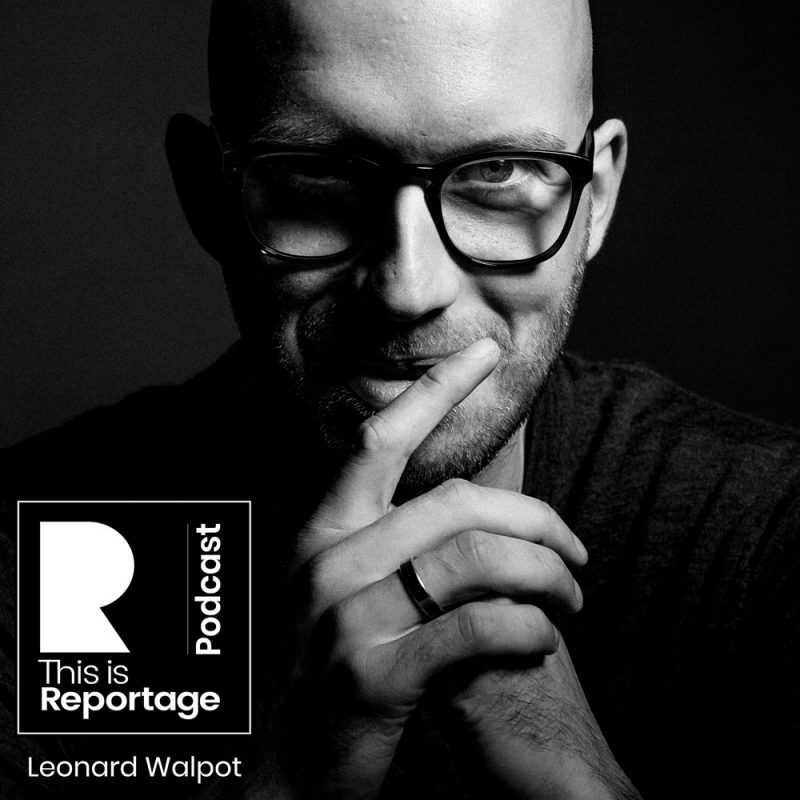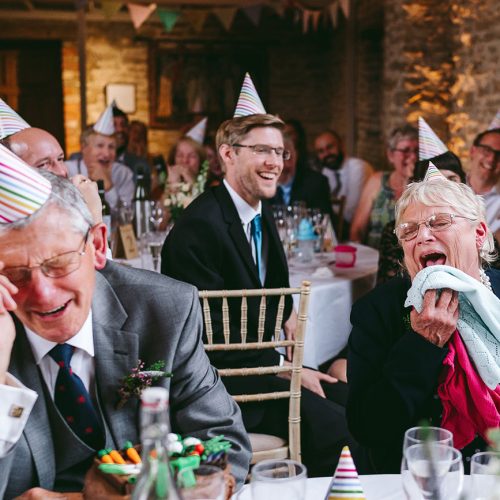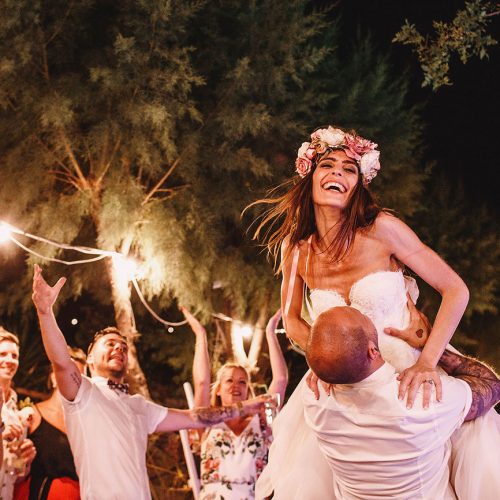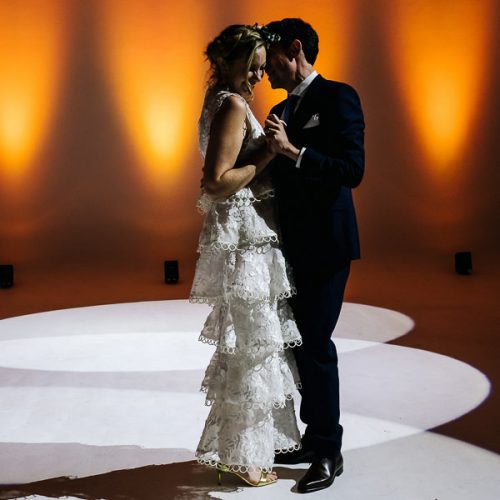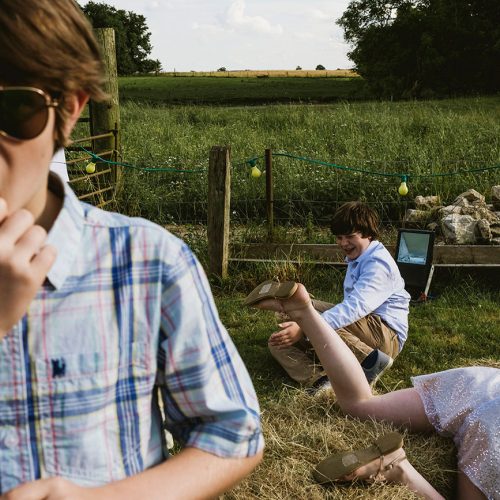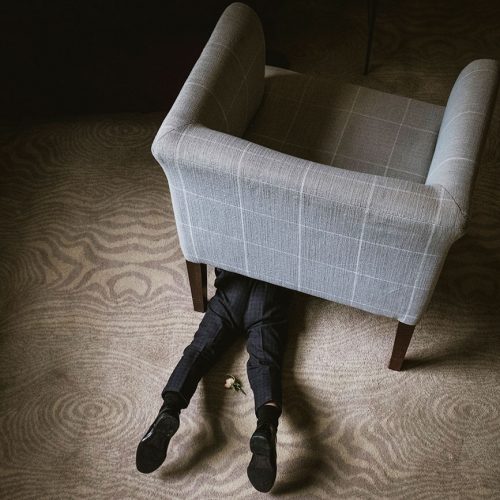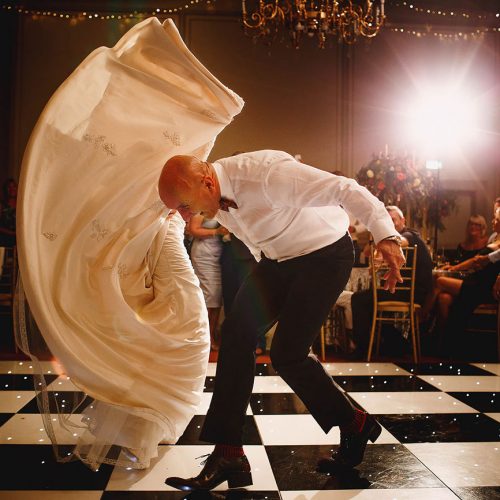Podcast Episode 15: This is Leonard Walpot
Really excited to bring you the awesome Leonard Walpot for episode 15 of the This is Reportage Podcast! One of the best documentary wedding photographers in the Netherlands, Leonard was joint-second overall on our Top Photographers of 2019 – and actually won more Reportage Awards than anyone else; a remarkable feat. Join us on the episode as Leonard has so much to share, including:
- how he enjoys the business side of wedding photography too,
- the story behind one of his specific Reportage Awards (the girl lying down in the ceremony),
- his journey from linguist graduate to wedding photographer,
- working with his wife,
- what, to him, is the most important thing in life,
- his political photography and how that affects his wedding work,
- why we should look at other fields of photography,
- a certain event that impacted his career,
- his workflow and how he edits,
- the importance of taking a step back from your work,
- how he uses flash,
- why you should watch 1917,
- the importance of having a mentor,
- balancing being a father and a business-owner,
- how he created Best Men Weddings with Jesse van Kalmthout,
- who he would be if he could be someone else for a day,
- what he’s afraid of,
- the benefits of a business coach,
- his tips for starting out in the industry,
- and much more…
There are all the usual ways to hear our Leonard Walpot interview, including iTunes/Apple Podcasts, Spotify, Google Podcasts, YouTube, and here in this post (where there’s also a full transcript).
Alan Law: Hey, Leonard. How are you doing?
Leonard Walpot: Hey, Alan. I’m fine. Thanks, man.
Alan Law: Cool. Really great to talk to you. Yeah, thanks.
Leonard Walpot: Yeah, yeah, yeah. Good to hear you.
Alan Law: We were just talking before starting this, and it’s strange for me to hear people’s voices after seeing little Facebook profiles for so long.
Leonard Walpot: Surprises you every time, right?
Alan Law: Yeah. And we’re also just talking about how to pronounce your name, so Leonard or Leonard. I’m going to call you Leonard. That’s okay?
Leonard Walpot: Yeah, yeah. Perfect.
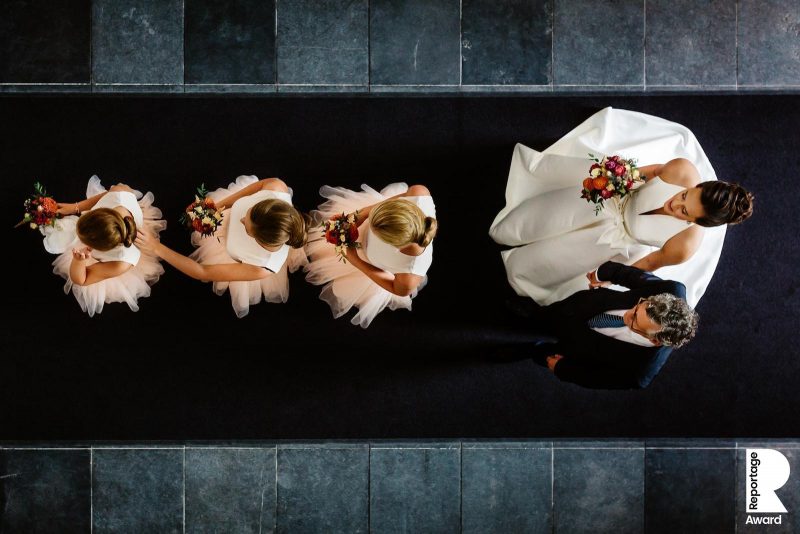
Alan Law: That’s cool. Good stuff. Yeah, how are you doing? How’s things?
Leonard Walpot: Yes. I’m good. I’m good. It’s always feels a bit strange, this in-between time of still finishing off the last season, because I still have some work to do. And, already, preparing myself for the next wedding season. I always have the idea, okay, in winter time I’m going to relax. I’m going to do stuff for my own fun and pleasure. Well, in the end, it’s just finishing off stuff, and already being busy with the next year. So it feels a bit strange and winter doesn’t help, to be honest.
Alan Law: What’s the weather like over in Holland at the moment?
Leonard Walpot: Well, it’s a bit around zero, to one, or two degrees.
Alan Law: That’s not nice.
Leonard Walpot: No, no, no, no. I do like the sun more, actually.
Alan Law: Yeah. It is a funny time of year for us, isn’t it?
Leonard Walpot: Yeah.
Alan Law: Do you have any specific plans for this year, or anything that you’re specifically going to change, or try new things, or put more energy into something?
Leonard Walpot: For me, this year will be, hopefully, I will continue what I’m doing over the past few years, so not any specific big changes or plans. I think the work that I do is too much to do on my own, so last year my wife joined me in my business. So we’re with the two of us, right now.
Alan Law: Cool. Does she shoot with you as well?
Leonard Walpot: Yeah. She joins me in about 10, 15 weddings each year to be a second shooter, but she does a lot of my editing.
Alan Law: Cool. That’s handy.
Leonard Walpot: Yeah, yeah, yeah. And also for some other photography, she does editing work. I’m growing. My business has grown, which sounds funny and weird to say, but it’s the fact. And I think I like that part of photography as well, being an entrepreneur or running a business, yes.
Alan Law: I totally agree with you. I really enjoy that side of it, as well. I guess it’s very subjective. A lot of photographers don’t like that side, but I think it’s good if you can enjoy it, because it’s such an important part of the business. Isn’t it?
Leonard Walpot: Yeah. I never realized I was able to enjoy that, but when I started out as a full-time wedding photographer, I found that I liked to have that part, as well. And I think still it is finding a balance between a photographer and being an entrepreneur, running a business.
Alan Law: That’s true.
Leonard Walpot: But I think in order to make a living out of photography, you have to balance that life between being… Following your passion as a photographer sounds beautiful, but I think there’s a responsibility for me, as a father, as a husband, as a family man, as well, to be able to run my business in a financial healthy way.
Alan Law: No, exactly.
Leonard Walpot: So I need to combine those things.
Alan Law: It sounds like you’re doing it really well at the moment. And you obviously are, because I need to congratulate you on coming second, joint second, overall in our top photographers of 2019, which is an amazing achievement. You actually won the most Reportage Awards out of anyone of the year with 11, which is fantastic.
Leonard Walpot: Yeah, yeah. Thanks, thanks. But I need to make sure that I will be putting more effort in my stories this year, giving the change of rules, which I totally agree with. So that’s good to do, man.
Alan Law: That’s cool, cool. Yeah, that’s cool.
Leonard Walpot: I think because This is Reportage will set itself apart and standout from other competitions, as well, by putting more energy, putting more weight on the Story Awards, I guess, so that’s a good thing.
Alan Law: That’s cool, cool. Thank you. I mean, and obviously I agree, but I do also think it’s still very valid to be celebrating these individual moments that are captured brilliantly. It really is. And as I said, you won 11, which is amazing. How do you do it? I know it’s a very broad question, but why do you think you’ve won so many? What is the secret to capturing so many brilliant individual moments?
Leonard Walpot: I think the idea of This is Reportage, nothing staged, nothing posed is really what is… That could be the tagline of my business, I think. I think, looking at that, it’s according to what This is Reportage wants to show. That is really what I do. That is really what my aim is in shooting weddings. I don’t pose anything. I don’t touch anything. What you see is really how things were. I do not want to interfere. Sorry, that’s not very English.
Alan Law: No, no. That’s okay.
Leonard Walpot: I don’t want to interfere, I think that’s the correct word.
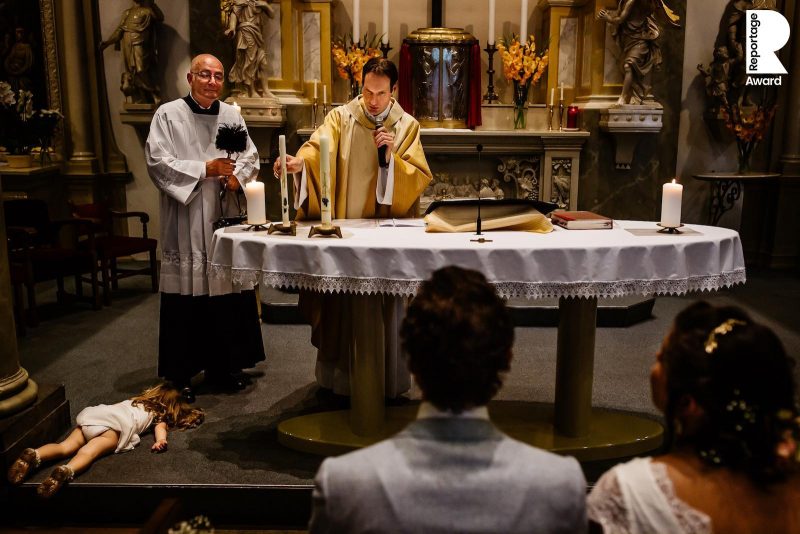
Alan Law: Yeah, definitely. Well, that’s cool. And you are nailing it though, and you’re so creative. I think your work is so dynamic and artistic. It’s brilliant. I was going to talk about it later, but it’s what is in my head now. I love one of your specific Reportage Awards (above), where it’s at a ceremony, and at the front a girl is lying facedown, and the ceremony is just carrying on. It looks like, with her, it’s facedown, lying down. It’s such a surreal awesome moment. Can you tell us a bit more about what was happening there?
Leonard Walpot: Yeah. Everyone asks me about that picture. Some people don’t see it, at first glance, looking at it.
Alan Law: I like that though.
Leonard Walpot: Then it’s suddenly there’s, “What? There’s a girl lying, what’s going on?” It’s a picture that raises questions, and I think I like that of photography, as well. I mean, you’re able to tell a story, but at the same time people are going to ask questions about what’s happening there. And in this particular image, it’s very basic actually. It’s the couple’s, which you can see by the back of their heads, it’s their daughter. She was running around for 15 or 30, or 15, 20 minutes during the ceremony, and at some point she got exhausted and she just laid down on the alter there, which is the story. And, basically, is the scene, at the same time, as well.
Alan Law: It’s cool. It’s cool. I just think it really shows the surreal-ness of weddings. They can be just so… They’re all so individual, and some are quite bizarre. That image, for me, really shows the power of photography, as well. You don’t really know what is going on and it’s open to different interpretations, really.
Leonard Walpot: Yes, exactly. Because this picture raised a lot of questions when it went online as well, where people really asked, “Is everything all right with this girl?” People were real when asking that. But it’s a fun story in the end. She was tired and she was laying down. And I think that’s the beauty of shooting weddings. This is also, in some way, getting close to people, to witness what is happening inside a family when they celebrate something. When you see that specific and particular stuff happen, I think that’s the beauty of shooting weddings.
Alan Law: That’s cool. Yeah, definitely. And they’ll be able to look back on that, as well. It’s only a small moment in their day, but they’ll be able to look back on it and remember it. That’s awesome. If people are listening now whilst they’re editing, or running, or walking head to thisisreportage.com and I’ll include that image in the post. You should definitely check it out. It’s great.
Alan Law: Let’s go back in time a little bit then. I read that you graduated as a linguist, is that right?
Leonard Walpot: Yeah, that’s right. You’re correct.
Alan Law: That’s cool. I mean, I can clearly hear that you’re speaking, at least, one other language brilliantly.
Leonard Walpot: The funny thing is, it was Dutch language and culture. That was the name of my studies, but I understand.
Alan Law: Okay. Cool. How did you get started in that? Is that something you always wanted to… I guess, you were always interested in. How did you go from graduating as a linguist to weddings?
Leonard Walpot: Yeah. I like language, so that’s a thing obviously. But I started out, when I first got to university, I studied communication sciences. The part of the curriculum that I exceeded, that I graduated for, was also part of Dutch language and cultures. And, at some point, I said, “Okay, you probably go and move into Dutch language and culture,” because it took a while for me to graduate the three year studies. And, in the end, it took me six years to graduate. No academic has been lost with me skipping all that stuff and going into photography, so to say.
Alan Law: Okay.
Leonard Walpot: If that makes sense? Yeah. Because after I graduated, I got to work for an NGO.
Alan Law: Okay.
Leonard Walpot: I was writing grant proposals for US aid, for Europe aid, and all that kind of stuff. After a year I got home, and I was burned out. I was still very young, to be honest, I was 22, 23 years old.
Alan Law: Right.
Leonard Walpot: But, at the time, I was already married and our first son was born already. So I think it all piled up and it was just too much doing the stuff that I probably didn’t really want to do in the end. So it took me a year to recover, and to reset, basically. I got into photography, because it was my hobby before. I did some stuff for other people, and they asked me to shoot a wedding once or twice or three times earlier during my studies.
Alan Law: Okay.
Leonard Walpot: When I recovered, I was able to do something else again. And from that moment on I was like, “Okay. And when I’m going to do this photography, it needs to be good. I’m only going to do this if I am going to give it my best.” It started that way, actually. And some day I had to say, “Okay, I’m a photographer now, and this is what I’m going to do, and I want to do it the best way possible.” And it started from there by shooting five or six weddings in 2013, and it was 20 weddings in 2014, and it was 30 weddings in 2015. It went quite quickly. And sometimes I try to go back to that time, and I think what was the secret. I mean, sometimes people ask, “How do I get more weddings?” People start for the first time, or in their second year, or third year and still struggling with getting more bookings. But I don’t know the answers, actually.
Leonard Walpot: I think if I go back and say what was the secret, it also lies in, not only being a photographer, but also being an entrepreneur.
Alan Law: Right, yeah. I mean, it’s so important.
Leonard Walpot: Yeah, yeah. Because I needed to live from what I was shooting.
Alan Law: Yeah, yeah. Definitely. Was it scary, though, when you made that choice of that change in career?
Leonard Walpot: No, it wasn’t scary back then.
Alan Law: No?
Leonard Walpot: I don’t know why, but, no. No.
Alan Law: Well, that’s cool. It’s almost like photography has been a bit of a… Because you said you were burnt out, so it’s been a bit of a saviour almost then.
Leonard Walpot: Yes. I think I got so much energy from this, because I found something that I love. I was able to work with, and for, people. I was able to do something creative, which is probably something innate that you need to do something with this, whether it be photography or making music or whatever. If you have this creative thing in you, I think there’s some way that it needs to go out. And the third part is being an entrepreneur, so running a business. Those three parts came together for me in photography, and from there it evolved very quickly actually.
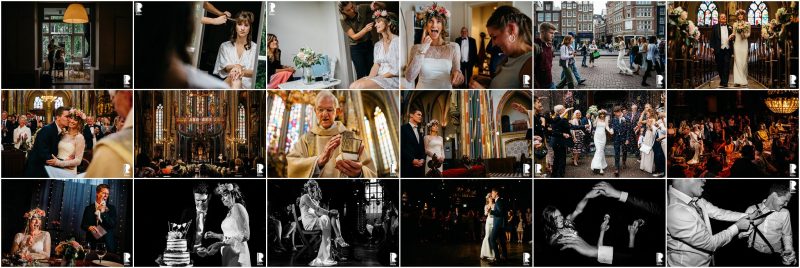
Alan Law: That’s cool. And it sounds like it suits you. Suits you down to the ground. It’s great. How are you finding, now, working with your wife? Do you ever argue at a wedding or anything or is it all good?
Leonard Walpot: It’s all good, yeah. Yeah, yeah. People are surprised that I’m able to work with Janneke together in a wedding or at home, because our office is in our house. But to us it works great. And sometimes, yes, you have to say, “Okay, this is work, and now we stop working. It’s evening, we don’t do anything.” But we enjoy it, so we don’t take it as a bad thing, if we talk about work during our free time.
Alan Law: No, that’s cool. That’s great you can do that. At a wedding, itself, do you have specific roles each? Does one of you do bride prep and the other do groom prep? Or do you just go with the flow?
Leonard Walpot: Yeah, we go with the flow. Yeah, yeah. I think I have to lead so people contact me, and they talk to me, and they see me, so they consider me as a lead photographer, but probably can change this year or next year.
Alan Law: Cool. I think it’s great. I think it’s great to have that working relationship. I really do.
Leonard Walpot: Yeah.
Alan Law: Let’s change tact slightly. Let’s go for this small throwaway question here. What, to you, is the most important thing in life? I know deep, deep. I think it’s very interesting, people’s viewpoints on this.
Leonard Walpot: Yeah. That’s a good one, and it’s a hard one, as well. But deep, deep, deep down, if you go deep down, it comes to the core of who you are. And, for me, one important is I’m a Christian, and I think there you touch something for what is the most important in my life will be, if I translate it well to English, I hope so, will be loving God, and loving your neighbor as yourself.
Alan Law: Cool.
Leonard Walpot: It’s a very basic principle, but if you do everything based on that, I think you will get most out of life, speaking for myself.
Alan Law: That’s cool. No, great.
Leonard Walpot: Yeah, yeah.
Alan Law: And that leads to, so as well as doing your wedding photography, you do some political photography don’t you?
Leonard Walpot: Yeah.
Alan Law: And something that you’ve won an important Dutch photojournalism prize for, as well. Can you tell us a bit more about that stuff that you do and how, maybe, it’s influenced the way you shoot weddings?
Leonard Walpot: Yeah. It’s very funny, because it started, as well, in 2013, when I became a photographer. I didn’t know right away that I was going to shoot so many weddings. That I was a wedding photographer, at some point, so at the same time, one of my friends from university got to work for a Dutch political party, and I saw they were hiring a photographer. It was very basic stuff. They had some subjects and they wanted to have some imagery to accompany the text that they wrote about it, so I joined. I went there and had a good conversation and they asked me to do the photos. I did some very basic stock photography stuff for them.
Alan Law: Right.
Leonard Walpot: And then say, “Okay, we’re happy with that. Can you shoot our Congress, which is next month?” Okay, I’m going to do that. And there were elections the year after, “Okay, can you do the portraits for the elections? And can you do this and that and that,” so that grew, as well. And in 2017, we had the general elections in the Netherlands.
Alan Law: Right.
Leonard Walpot: Because the imagery was very important for that election, and, I mean, for every election, to be honest, I think. They asked me, “Can you make a proposal to do this, all the portraits of all the candidates? Can you follow our main candidate for a while? And can you do this and this and this?” I wrote a proposal to them. I’m going to be there from November, December, until March, where the elections happened. That was great, because that was really at the time where I had less weddings. I mean, in winter time. I was able to follow the election campaign and I said, “Okay. I’m going to shoot this, but please allow me to be there, not only for this particular picture you asked for, but let me join the whole day.” That went on for a couple of months, especially from January til March, I had been following sometimes four, five days a week. I’ve been following the main candidate together with his political assistant.
Leonard Walpot: So we were, the three or four of us, going through the Netherlands, and I was just documenting that. I was not interfering. I was just shooting what I saw, all little stories, what is happening. Because I was always there, I got all the freedom and they really trusted me in what I make, and also in what I do, and also how I behaved being among them. I was able to get very close and I loved to do that. It was very inspiring, as well, to do that. And it really also helped me in the more photo-journalistic stuff, also in weddings. I was forced to work in a specific way, which tends to work in weddings very well, as well.
Alan Law: Right, okay. And I’ve seen some of the work that you won that prize for. It’s brilliant.
Leonard Walpot: Thanks.
Alan Law: So good. Honestly, I’ll put a link through to it, as well. People should really check it out.
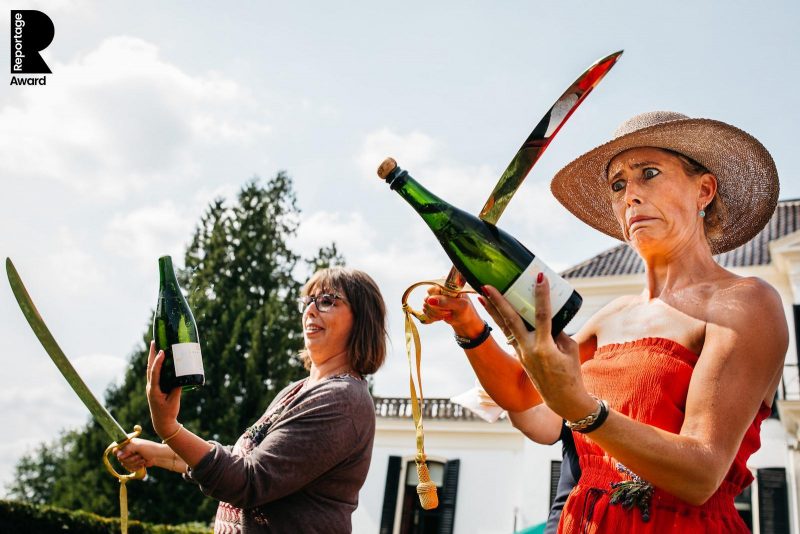
Leonard Walpot: Yeah, that’s nice. That’s nice. The thing that also comes with that is, if you say you’re a wedding photographer, sometimes people say, “Okay, if you don’t know what to do, you can always become a wedding photographer,” like that. You know what I…
Alan Law: Yeah, I know what you mean.
Leonard Walpot: I think, also, among photographers, wedding photography is the thing you’re going to do if you don’t know what else to do.
Alan Law: How to do anything else. I get that, but do you think that’s changing? I think it really should be changing, that viewpoint, now.
Leonard Walpot: I think it’s changing, but I made it my mission to help change it more. I try to do that. When I’m in the Hague, which is the political center of the Netherlands, there are some press photographers, which I really admire and look up to. But I got to know them, they got to know me. They see what I do, and they really see, I think, that it is possible to shoot a wedding in a very interesting journalistic way. It works both ways to have interest in one’s profession in someone’s specific subject of photography. And, especially for me, it’s interesting to see what press photographers and political photographers do. I think it’s interesting for them, as well, to see what we, wedding photographers, do.
Alan Law: Yeah.
Leonard Walpot: Because we create this world, as photographers, we look at each other’s work. As wedding photographers, we also know what is happening, who is doing what, who is seeing each other. And I think sometimes we are too much creating this little world of wedding photography, and I think it’s good to have all these contacts and to create this online world. But there’s a world out there that doesn’t, specifically, know what we do. I think a lot of people still think that taking wedding photos is putting a couple behind a tree and have them look to you, right?
Alan Law: Yeah. That’s so true.
Leonard Walpot: That’s totally changed, and I think it’s good that we, as wedding photographers, also show that to the world.
Alan Law: I couldn’t agree with you more, and that’s one of the main reasons of starting This is Reportage was to show that.
Leonard Walpot: Yeah.
Alan Law: So I couldn’t agree with you more. That’s cool. When you talk at those political events, when you talk to other press photographers, do you mention how you’re a wedding photographer, as well, or do you not tell them?
Leonard Walpot: They know by now.
Alan Law: Do they, yeah.
Leonard Walpot: Yeah, because I started to get in touch with them, and also they see my work now on Instagram and Facebook. That’s nice. Yeah, we talk about it.
Alan Law: Okay, that’s good. Because it so shouldn’t be looked down upon, at all. It’s such hard work. It’s so creative. It’s art on the fly. You’ve got this one chance to create it, as well. It’s an amazing skill. It really is.
Leonard Walpot: Yeah.
Alan Law: But I’m not going to get on my high horse about it.
Leonard Walpot: No, no. You’re right, I know. But I think it’s good to realize that, and it’s good, at the same time, to… I mean, for me, it’s good to stay humble, to be close to myself and say, “Okay, in the end, we’re just taking pictures.” Also, it’s finding balance in it. I think if you live a balanced life, it helps you.
Alan Law: Yeah, definitely. When you meet potential clients, or Skype them, or however you do that, do you talk to them about your political work, as well?
Leonard Walpot: Sometimes. Some do know, and the funny thing is, I also get weddings from that stuff.
Alan Law: That’s cool.
Leonard Walpot: Yeah, yeah. But sometimes I mention it, and I have this certificate.
Alan Law: Cool.
Leonard Walpot: I have a certificate, “You won the first prizes Dutch Silver Camera.” I have it in my office, so people can see it, if they want. They can relate to that and I’m going to talk about it.
Alan Law: That’s good talking point.
Leonard Walpot: It’s a good talking point, and not all the time, but it’s not a problem. Sometimes people like it and are interested in that, as well, and want to hear about it, so then I talk about it.
Alan Law: That’s very cool. No, it’s great, man. It’s great.
Leonard Walpot: Yeah, yeah.
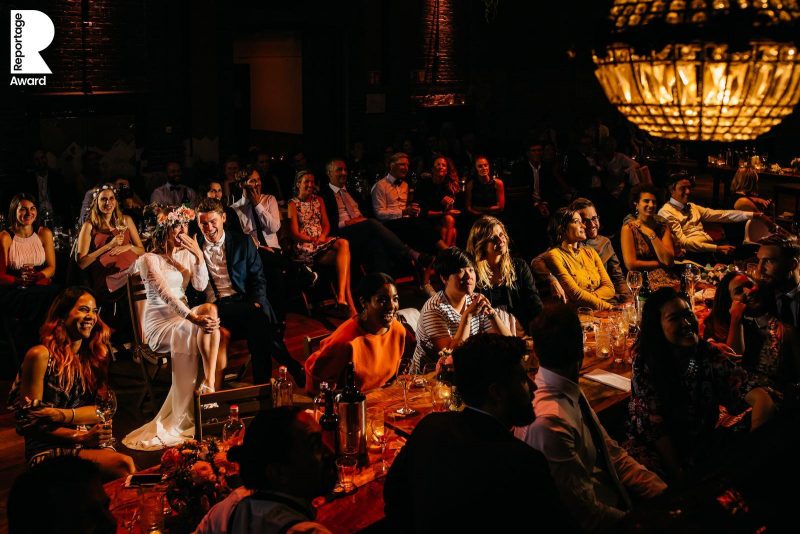
Alan Law: Okay, let’s change tact slightly again now. What’s the funniest thing that you’ve ever seen at a wedding? I know, I tried to think, with these questions, I’m like, “What was the funniest thing I’ve seen, as well?” It’s quite hard, isn’t it?
Leonard Walpot: Do you know the answer? I mean, just putting back the question, so I got more time to think about it.
Alan Law: Man, I know it’s difficult, isn’t it? When someone asks you that question, your mind can go blank, as well, because we shot so many weddings.
Leonard Walpot: Yes, yes. I’m blank on that. I don’t know. I see a lot of funny stuff. Maybe, just simple, it will be the image, but it’s not… Probably, the image of the girl lying down.
Alan Law: Well, it’s quite funny, and quite surreal as well.
Leonard Walpot: It’s not as funny, but it is funny, because it’s a picture, now.
Alan Law: Yeah. For me, personally, I think I don’t know if people will be interested, but one early on in my career, I had a bride who had drank quite a lot, and at the end of the wedding she laid down over the buffet, over all the food and everything, literally, laying on all the food and wanted me to take a photo. That was quite bizarre. Anyway, let’s move on from that.
Leonard Walpot: Yeah, yeah, yeah.
Alan Law: Has there been a specific turning point in your career? Maybe, perhaps, a certain wedding or a certain award, or something that’s had a major impact on your career, do you think?
Leonard Walpot: Yeah. It’s a funny story, but not a funny thing. I think one of my first… It was among my first five weddings in 2013. I was, at the time, I was discovering this world of wedding photography, and how to behave, and what to do, and what not to do. We were at the ceremony and there was a white table, very nice, where the officiant was standing behind that table. But the keys of the car were on the table, so I thought, “That’s not very nice to see the keys of the car, having the keys of car in the picture,” so I moved the keys. And I thought, “Okay, I’ll just put them in my pocket, and will be laying them there somewhere else.” But I totally forgot about the keys, and the ceremony was over, and I got to the other location. And I was waiting for them, and waiting.
Leonard Walpot: And, at some point, they arrived in just a normal car. It was like, “Yeah, we couldn’t find the keys of our car.”
Alan Law: That’s so funny.
Leonard Walpot: They were still in my pocket, and I was ashamed. I was so, so, so ashamed. And it really was the biggest turning point in my early career. I will never, never, ever, ever touch anything again, and I still stick to that.
Alan Law: That is a cool lesson to learn, and what a way to learn it.
Leonard Walpot: Yeah, yeah. They weren’t mad. They weren’t mad happily. Luckily they weren’t mad at me.
Alan Law: That is good.
Leonard Walpot: But it really teach me a lesson. It was, for me… And still, I see some other documentary photographers maybe touching stuff, or putting a chair away, or a table aside to have better light, or whatever. And I’m fine with people doing that, but I’m not going there myself. I’m not doing that. If the light is bad, I need to work harder to create something with the bad light. This rule was written in my heart or whatever.
Alan Law: What a way for it to happen. That’s great.
Leonard Walpot: Yeah.
Alan Law: That’s a great story. I love little stories like that. That’s super. And it’s good the couple were fine with it. Did you admit straightaway, “I’ve got the keys.”
Leonard Walpot: I had to admit, because I was, “Oh, shit,” and there were the keys.
Alan Law: That’s funny. That’s funny.
Leonard Walpot: Yeah.
Alan Law: Cool. Let’s go onto, maybe, can we talk about, maybe, just… Because it’s something I’ve never asked any photographers on the podcast, actually, and I think it’s something people will be interested in. Maybe, how you do your editing at all. Maybe something about your workflow or any tips and advice that you’ve learnt over the years.
Leonard Walpot: Yeah. For me, it’s important to backup straightaway, but I think that’s for everyone, and I think people can relate to that. When I come back from a wedding, I will backup the stuff to two different hard drives, and it will go to Backblaze. I use the online system for having an online archive as well.
Alan Law: That’s cool.
Leonard Walpot: And I try to cull the images as soon as possible. Usually, I take Sunday off, or Monday sometimes, as well, if I have a Friday and Saturday wedding, which happens a lot in the Netherlands.
Alan Law: Right, okay.
Leonard Walpot: Monday or Tuesday I will cull the images, and then I will cull them down until five, 600-ish, and that will go into Lightroom, and I will edit all the images in Lightroom.
Alan Law: Cool.
Leonard Walpot: It’s important for me to cull the images as soon as possible, because I have the moments that are important. They are still in my head, as well, and I think I realize, when I cull them, I know which is the best picture.
Alan Law: Yeah, I think-
Leonard Walpot: Because it’s so fresh. Does that make sense?
Alan Law: Yes, totally. I totally agree with that, and that’s something that I learned, as well, actually. Because I used to cull my weddings, maybe, a week or two after I’ve shot them. But now, I’m like you, I cull them the day after, so I know I can remember, actually, I got a better photo later on in the day. It really helps, doesn’t it?
Leonard Walpot: Yeah, exactly. And I try to play with that, so sometimes I just lay it down and I come back to a wedding two weeks after and try to cull it then. But it’s a totally different experience, because sometimes I wonder, “Have I really seen the best images?” Because I’ve found, as well, that I need distance and time from looking at my pictures, because it’s difficult for me to look at my own work, to be honest, because I think I’m a perfectionist, as probably many more photographers are.
Alan Law: Yeah.
Leonard Walpot: And I sometimes go six or seven months after a wedding, and I already have delivered them to my clients. Then I go through the pictures again and I think, “Actually, it’s quite okay, I can be happy with this results,” which is very difficult for me to have two months after the wedding when I delivered them. I really want to work on that. In order for me to be more happy with the series that I deliver, I think it’s good to not be too hard on yourself.
Alan Law: Right, yeah.
Leonard Walpot: Because you see, in the long term, you won’t be as hard, as well.
Alan Law: Yeah. That’s so true. I think just, in general, as photographers, as well, we are so hard on our own work. A lot of photographers don’t sit back and appreciate that they’re putting out some really good work there. We always see the faults and the imperfections in our images, but it’s good to sit back and think, “Well, actually, I did a pretty good job there.”
Leonard Walpot: Yeah. And I think it is very difficult. I mean, you have to learn that, but it helps. Like what I said, if you go six months back and take a wedding from half a year ago, and you go and see, and go through this, and you see, “Okay, I can be happy with this.” Next time I try to do this with a wedding five months ago, and a wedding which is four months ago. It really helps me to make the distance shorter, looking at my own work. If it makes sense?
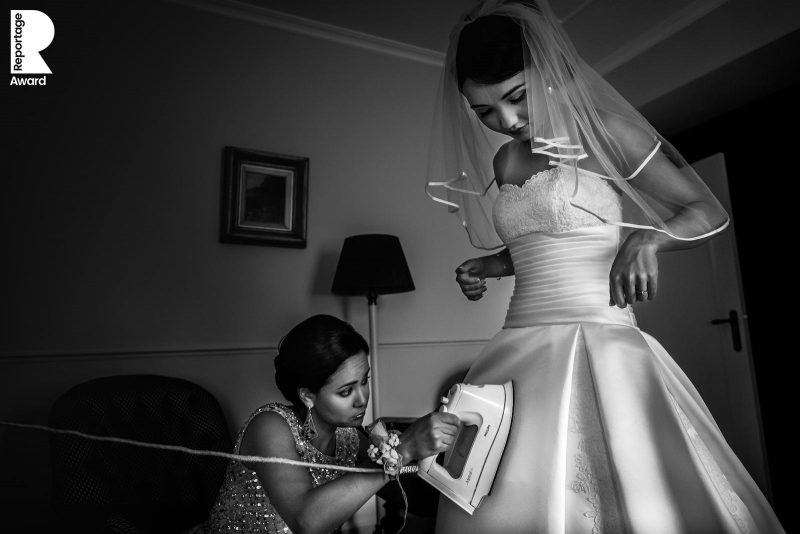
Alan Law: Yeah. No, I get that. That’s cool. How long, in general, does it take to edit wedding? Do you know?
Leonard Walpot: It’s difficult for me to edit it in one take, so it usually takes me a day, but it will be during a week or so.
Alan Law: Right, yeah. Do you use any keyboard shortcuts while you’re editing?
Leonard Walpot: Yeah. I’m a huge fan of Motibodo.
Alan Law: Cool, okay.
Leonard Walpot: Some people say it works. Some people use pFixer, or whatever, but I use Motibodo for four or five years, and sometimes it’s difficult with the updates of Lightroom, and updates of Mac OS. It goes wrong, so I’m very reluctant always in updating my stuff. But Motibodo helps me tremendously in my workflow, in the speed of editing. Because if you see a picture, which is too dark, or which is whatever, too light, if you see in your head the end result, and if you’re able with Motibodo to quickly go to that end result. Well, that’s good.
Alan Law: Yeah, definitely. That’s cool. Great. Cool, thanks for that. That’s great. I’d like to go to a question that a Reportage member wanted to ask you actually: Kim Burrows would like to know about your use of lighting. If you stick mostly with natural light or use a lot of artificial and, if so, what kind of equipment are you using?
Leonard Walpot: Yeah. I think, over the years, I’m trying to work with lighter gear, or less gear, to be honest, because I’m shooting Canon, so it’s not lighter gear. Lighting is an important part for that, and I think throughout the day, I can go with just two flashes, which I barely use. I use most of artificial light will be used in the evening, during party, will be two, three flashes.
Alan Law: Right, okay.
Leonard Walpot: And during the day, I try to go with natural light, because I don’t have to use flash light, I don’t use it. It’s not that I can’t use it, but I don’t use it.
Alan Law: No, that’s cool. Do you ever use flash for speeches?
Leonard Walpot: Yes, yes. For speeches, as well. So during dinner and when I have speeches at dinner, usually it’s a bit darker, so it helps me to create a more dramatic effect, probably, with flashes. And I think it’s just nice to light people.
Alan Law: Yeah, cool. It really looks great in your work, totally, really good.
Leonard Walpot: Yeah. Usually, when during speeches, it will be two flashes, one pointed towards the best man, or father, or whoever is speeching, and one towards the couple.
Alan Law: Right.
Leonard Walpot: And I think my main objective will be, or the funny thing for me, the thing to play with, will be to have an overall image with both the father and the couple in one image. That will be great if it’s lit very well. I love that.
Alan Law: That’s cool, yeah. Cool. Awesome. Thank you. Thanks. That’s awesome. Let’s change tact again slightly now to another very important question I haven’t asked in a while. Do you eat the canapes?
Leonard Walpot: Yes.
Alan Law: Good. But there’s a but to that question.
Leonard Walpot: I should, it’s the most important question. I forgot you were going to ask this, but I’m not going to be the first one to have one.
Alan Law: No, that’s good. That’s good. Wait until, at least, one person has had one.
Leonard Walpot: Yeah. No, and then still, I see… Yeah, I’m just waiting for the right moment. See if sometimes if there’s something left or whatever. I mean, if it’s a reception and everyone is standing, and you walk around, you can think about how you’re going to walk in order to see how the waitress is walking. “There you are, hi.” “Do you want something?” “Yeah.” Make sense?
Alan Law: Yeah, no that’s cool. Definitely. I know some photographers say they get the waiter over to say, “Can I just take a photo of them?” And then they take one.
Leonard Walpot: Yeah, that’s a good one. I never done that, but I can do that, yeah.
Alan Law: All these different techniques.
Leonard Walpot: Sometimes, yeah. It’s a good technique, but usually when they have a full plate, I want to take a picture, but I don’t dare to take one.
Alan Law: No, I don’t either, to be honest. I don’t.
Leonard Walpot: Becasue still I will be the first one then.
Alan Law: Yeah.
Leonard Walpot: Dilemmas, that’s very ethical there.
Alan Law: That’s funny. I’m quite interested in this, as well, has there been a book that you’ve read, in your life, that’s had a lasting impact on you in some way? It could be fiction or nonfiction.
Leonard Walpot: I’ve read a lot of books when I was younger. I think, it’s a pity, but I don’t read so much anymore these days. I want to read more, so it’s difficult for me just to pick one book. It’s like saying, “What’s the most funny thing you’ve ever experienced.”
Alan Law: What’s the funniest thing you’ve ever experienced?
Leonard Walpot: No, you already asked that.
Alan Law: I know, yeah.
Leonard Walpot: It’s the same thing for me, get totally blank.
Alan Law: It is a tricky question, isn’t it?
Leonard Walpot: It’s a tricky question. It’s the same with what’s your favorite movie?
Alan Law: What’s your favorite movie?
Leonard Walpot: Yeah. Okay, I went to see 1917 yesterday, so now it’s 1917.
Alan Law: I really wanted to watch that. Is it good?
Leonard Walpot: Yeah, I recommend everyone who hasn’t seen it, just go and see 1917, because the way this is made is astonishing. It’s great.
Alan Law: Cool.
Leonard Walpot: It’s a masterpiece. You can see by seeing it one time, you can see, okay, this is going to last. This is going to be a masterpiece.
Alan Law: Man, I really want…
Leonard Walpot: I would actually say this is going to be a masterpiece, like The Godfather is a masterpiece.
Alan Law: I’ve never seen The Godfather, actually.
Leonard Walpot: No? I’ve never seen Star Wars.
Alan Law: Really?
Leonard Walpot: Don’t know why I’m saying that.
Alan Law: No, that’s cool. I really want to watch 1917. I’ll hopefully go on Friday to see it actually.
Leonard Walpot: Yeah, yeah, yeah. No, it’s a film. It’s for people who create something with imagery. It’s a must see, even for a photographer. You think, “How did he do this?”
Alan Law: It’s supposed to be filmed in the style of one long take. It isn’t one long take, but isn’t supposed to be filmed in that style, so it looks like one long take?
Leonard Walpot: Yes, it looks like one take. I don’t go into spoilers there, but, no, it looks like one take. It has this span of 24 hours, roughly, in two hours, so it couldn’t be one take, obviously. But still it looks like one take. It’s great.
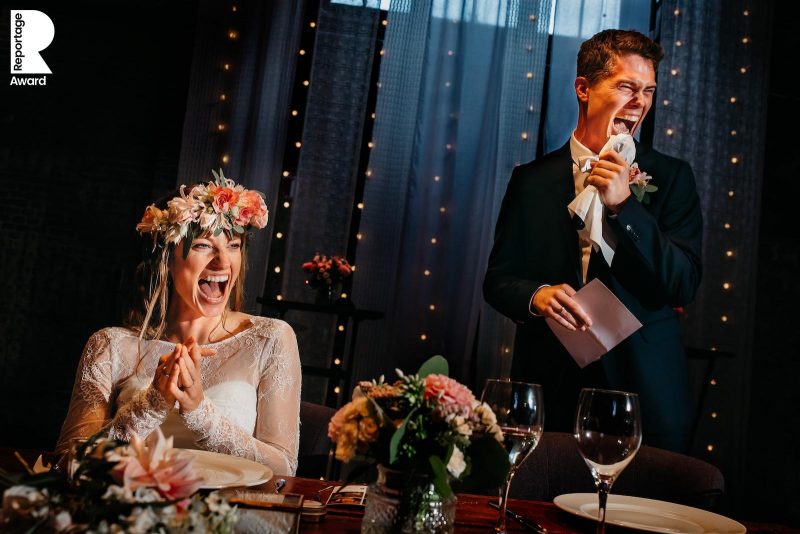
Alan Law: I got you. I will check it out, hopefully Friday. I’ve read that you have a mentor. I know you also offer mentoring yourself.
Leonard Walpot: Yes.
Alan Law: I just wonder how do you find that being both the mentor and the ‘mentoree’. I don’t think that’s a proper word, but you know what I mean.
Leonard Walpot: Yeah, I get the point.
Alan Law: How do you find that?
Leonard Walpot: I think, for me, it’s important to have a mentor, because I’ve never studied photography. I mean, you can study photography by just looking at others, but I think it’s very helpful to have someone looking at your work and to discuss your work on a regular basis with. I have had several photography mentors and, currently, it is Tyler Wirken.
Alan Law: Cool, yeah. Docu man.
Leonard Walpot: Yeah, yeah, yeah. Exactly.
Alan Law: Awesome. I was just wondering, actually, how did you find your mentors? Did you specifically have some photographers in mind, even if they maybe weren’t offering mentorships and approach them? Or did you look for photographers who were specifically offering mentorships?
Leonard Walpot: I do look for photographers who offer mentorships.
Alan Law: Right, okay.
Leonard Walpot: But, to be honest, I never thought of that question in that way. I also could ask photographers if they want to give mentoring. But I asked to a photographer once and she said, “No, I don’t do this. I don’t know exactly what I can offer you, so I don’t do it.” But that’s okay, as well. But, Tyler Wirken, and I had mentorships with Kelly Rashka, and Sergio.
Alan Law: Cool, quite a few.
Leonard Walpot: Yeah, yeah. They really helped me. They really made me a better photographer, yeah.
Alan Law: That’s great. And how have you found now, because you are a mentor yourself of other people. How have you found that? Do you enjoy that?
Leonard Walpot: I do enjoy that, but, at the same time, I think it’s difficult because you see, very quickly… The questions people have are not technical. I mean, people know how to take pictures. They want to get better at it, so you can help in that slightly. I see the questions people have are very often going into the field of psychology. I mean, about mental stuff, and I’m not a psychologist. Sometimes it’s a tricky part to say, “Okay, I’m a mentor. I’m going to say how you need to do this. How you need to do that.” Yeah, it’s difficult sometimes for me, so it’s not something… I’m very specific on who I’m going to mentor.
Alan Law: Okay, right.
Leonard Walpot: And I want to know what people are asking for, I want to know what people are looking for, and what they are struggling with. And when I know that, I say to them, “Okay, I can probably help you with that. But if you are struggling with the more mental stuff, I’m not the right person, because I’m a photographer, I’m not a psychologist.”
Alan Law: Right, sure. That’s cool.
Leonard Walpot: Yeah. I think that more and more people are offering mentorships, and I think that’s great and it’s good, because we can learn from each other. But, at the same time, I think it’s good to realize that we’re photographers, and that we are not the ones that are able to help people with the more mental stuff.
Alan Law: Yeah. That’s good. Yeah, definitely a good way of looking at it. Yeah, it does make sense. We’re not psychologists.
Leonard Walpot: No, right.
Alan Law: Unless you happen to have a degree in psychology.
Leonard Walpot: Yeah, true. I know photographers who have a degree in psychology, and I say, “That’s a goal of mine. Make it your business.”
Alan Law: No, that’s cool. I think you’ve got two boys haven’t you? Is that right?
Leonard Walpot: Yes, that’s right, two boys.
Alan Law: How do you find being a dad and being a wedding photographer as well? Do they understand what you do every weekend? Do they want to be wedding photographers when they grow up?
Leonard Walpot: The last thing, I don’t know. I haven’t heard them talking about that in that way, but they understand what I do. Sometimes it’s difficult, or different, I need to say, because I’m not at home in the weekend. I’m shooting a wedding on Saturday, so I need to find the time during the week with them, which is different from friends of theirs. People with just a nine to five jobs, but I’m not going to change with those people. We have to find a way to work with that, and I think it works for us. But sometimes you need to find the right time, or to make the time, during the week, so I try to say, “Okay, this is a Wednesday, which I’m not working, and I’m going to do something with the boys because I’m away on Saturday.”
Alan Law: We’re lucky that we can do that, though, as well. We see, especially when our kids are very young, I think we get to see them more often, than a father who’s working a nine to five job.
Leonard Walpot: I think so. I think that is true. I try to be happy with that and enjoy it as much as possible, because I also see… It’s sometimes difficult. I mean, you have a business, which needs attention, which needs energy, which needs to grow. But, at the same time, I realize this is the only time I can spend with the boys.
Alan Law: Yeah, it’s tricky. It’s so tricky, because, one is so important for the other, as well. You have to have the business, so you can provide for your family now.
Leonard Walpot: Yeah. Yeah, yeah, yeah.
Alan Law: It’s so tricky and I totally relate to that, as well.
Leonard Walpot: Don’t feel ashamed for me, but it’s also, there, it’s about balance.
Alan Law: That’s so important. That’s such an important thing. You’re so right. I was going to say something. Yeah, about do you show your wedding images to your sons? Do they like them?
Leonard Walpot: Yeah, they like them. They’re very proud. Sometimes they say, “My father is one of the best photographers in the world.” They tell their friends, so that’s great. And, really, at that point, then I’m going to believe it is true.
Alan Law: If your boys say it, it is true.
Leonard Walpot: If they say so, it’s true.
Alan Law: It is true anyway, man. You’re awesome.
Leonard Walpot: I don’t want to say that, because it’s…
Alan Law: I can say it. It’s okay.
Leonard Walpot: Okay, okay. If you say it.
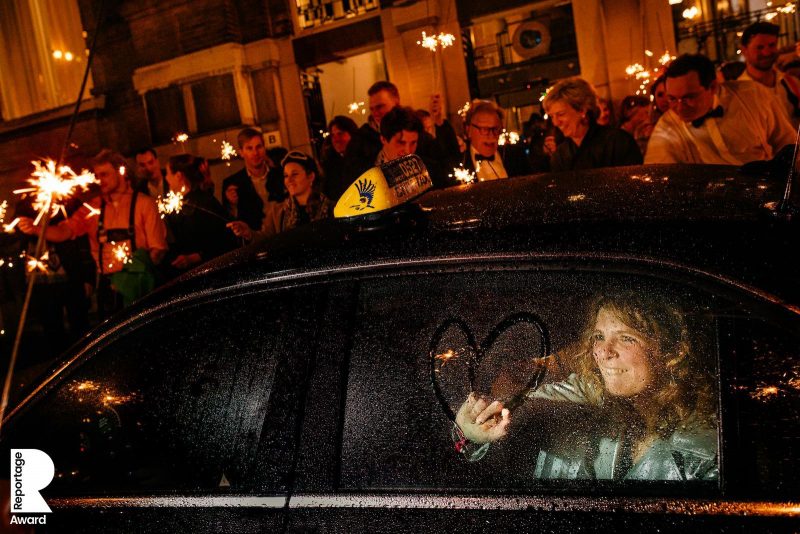
Alan Law: I think you, along with… You founded Best Men Weddings with… I might let you say his name in case I pronounce it totally wrong. Is it Jesse van Kalmthout?
Leonard Walpot: Yes, very good. Very good.
Alan Law: Was that okay?
Leonard Walpot: I hear your British by saying that, but Jesse van Kalmthout. We have Best Men Weddings, which is great. That’s a funny story, as well. I got to know Jesse at one of the first workshops I followed with Jeff Ascough.
Alan Law: Right, okay.
Leonard Walpot: Yeah.
Alan Law: Yeah, I know him.
Leonard Walpot: He quickly became a good friend, and we got to shoot some weddings. So every year, we do two, three, four, five weddings together.
Alan Law: Cool. Are they more aboard, are they?
Leonard Walpot: Yeah, they’re more abroad, so they’re more like Spain, Italy, France, mostly Italy, actually, because we both love Italy. I love Italy and Jesse loves Italy. So we go there, and I’ve been in several places in Italy. I think it’s fun to do something like shooting a wedding with a good friend.
Alan Law: Cool. What was the original idea for that?
Leonard Walpot: Sorry, we’ve been in the UK once, as well, actually.
Alan Law: Have you? Cool. Where did you shoot?
Leonard Walpot: In Ascott.
Alan Law: Okay, nice.
Leonard Walpot: Yeah. And then we… They lived near Ascott, we had to go to Cain Manor, which is…
Alan Law: Yeah, I’ve shot there.
Leonard Walpot: Yeah?
Alan Law: Yeah, I have a few years ago. It’s a nice place.
Leonard Walpot: That was a few years ago, as well. It’s a nice place. It was in November, a bit chilly, rainy weather. Typical, British actually.
Alan Law: Yeah. I think you’re probably better doing more weddings in Italy. That’s probably a bit nicer.
Leonard Walpot: Yeah.
Alan Law: It’s cool that you’ve got that different arm, though, a different side business.
Leonard Walpot: Yeah. It’s not a necessity, but it’s just for fun. And if there’s the possibility, we go together, and mostly abroad, like you said.
Alan Law: Cool. No, good stuff. Good stuff. Let’s change tact again slightly. If you could be someone else for a day, living or dead, who would you be? It’s a bizarre question.
Leonard Walpot: It’s a bizarre question, but I think it will be Pete Souza.
Alan Law: Really? Cool.
Leonard Walpot: Yeah, he inspired me, obviously, a lot with being the photographer of Obama. I met him, actually, two years ago.
Alan Law: Really? Cool. What was that like?
Leonard Walpot: He was in the Netherlands for the World Press. He gave a speech at the World Press and I was there just after I won the Dutch Silver Camera Award. And then the chairman of the Silver Camera introduced me to him. Like he said, “Our Dutch Pete Souza.” I was like, “No, no. Don’t do that.” But it was fun, and I think it will be interesting to shoot like he did for so long. I mean, he was Obama’s photographer since 2005 until 2012. It was his life.
Alan Law: Wow, yeah. Photographing one person for that amount of time.
Leonard Walpot: Yes. Yeah, yeah, yeah.
Alan Law: I mean, you did a lot when you were covering that one candidate and his assistant for so long, as well.
Leonard Walpot: Yes, but it was four months and it felt like, “Okay, this was huge.” But then, if you compare it to what Pete Souza did, it’s crazy what he did. And in a consistent and good way he shot, it’s amazing.
Alan Law: That’s cool. I wonder how many images he took in total?
Leonard Walpot: Yeah, yeah, yeah. He shared it somewhere, but I forgot how many there were.
Alan Law: Really? I bet it’s more than 1,000.
Leonard Walpot: Yeah. That’s a good question. Sometimes people come up to me at weddings and they say, “How many pictures you already taken?” I’m like, “Well, at least 10.”
Alan Law: Yeah, and they’re all awful.
Leonard Walpot: And they’re like, “huh?”.
Alan Law: I know, I do that. It’s quite funny, isn’t it?
Leonard Walpot: Yeah.
Alan Law: It’s funny. What are you afraid of?
Leonard Walpot: Snakes.
Alan Law: Are you? Yeah. That’s funny. Have you ever held one?
Leonard Walpot: No, no. I was five years old and in the Netherlands, in the south of the Netherlands, there’s a zoo with only reptiles. And I had nightmares for three weeks. Well, it’s not afraid, I’m scared to death of snakes and reptiles.
Alan Law: No, yeah. Is there a film called, Snakes on a Plane?
Leonard Walpot: No, I don’t dare to look that.
Alan Law: Okay. That’s funny.
Leonard Walpot: In a more specific way, in a more serious way, talking about what am I afraid of, is am I going to get enough clients the next year? And how is my business going to survive in five years? And I think, “Okay, what am I thinking of five years? I just need to make sure I’m doing my work in a proper way today, and then I need to go do that tomorrow again, and the day after tomorrow.” Sometimes I’m an over-thinker, which sometimes is a problem.
Alan Law: I think so many photographers will relate to that. Same here, worrying or thinking about the future, and is my business going to carry on doing okay? Am I going to be able to pay the mortgage?
Leonard Walpot: Exactly.
Alan Law: It’s hard to live in the here and now, and appreciate what’s happening now. I think we’ve always got our eye on the future, and it means we’re sometimes not living, at all, really, because we’re always thinking about the future.
Leonard Walpot: Yeah, yeah. And in order to get more grip on that, I started to not only do photography workshops and stuff, but also more into the business stuff, and the mindset stuff.
Alan Law: Right.
Leonard Walpot: And I think that really helps. It helps you to be more present, to be more in the moment, also regarding your business, so that’s a good thing.
Alan Law: When you’ve done your mentorships, have they always been very photography specific or do you also talk about business, in general, as well?
Leonard Walpot: Yeah. I talk about business in general. With the photographers, they’re more photography oriented.
Alan Law: Right, okay.
Leonard Walpot: And then last year I took a totally different approach with going to a business coach, who has nothing to do with photography at all.
Alan Law: Okay.
Leonard Walpot: But with business and with goals in your business, and with your mindset.
Alan Law: Was that good? Does that work out well?
Leonard Walpot: Yeah, I recommend it to everyone. I mean, if you’re new in business. When you’re a photographer for the first four, five years, you can get energy from learning stuff in photography, but, at some point, I came to a point that I needed to learn also about myself. I needed to learn about running a business in a proper way. When you are at a certain point, you start yourself asking questions. What am I going to do next year? How I’m going to keep on being a photographer? What is the next step to take? I think that is the point you really need to think about yourself and need to make sure you go and broaden and widen that perspective of your business, as well.
Alan Law: Great advice. Great advice. Cool. I think we’ve got time for one last question.
Leonard Walpot: Yeah, yeah.
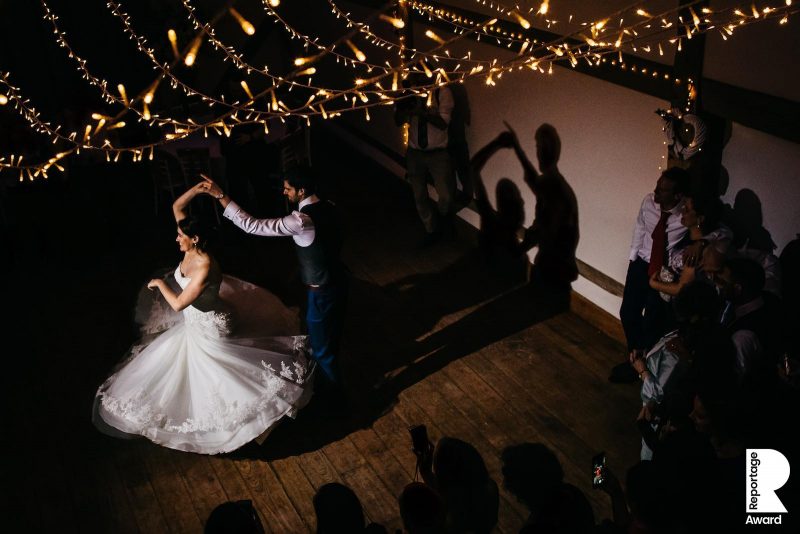
Alan Law: This has gone so quick. I’m just looking at the clock, wow, that’s gone so quickly. What would be your top tips for people just starting out in the industry? I think a lot of people will listen to this podcast from all different ranges of where they are in business, but some are, obviously, just starting out. You’ve done so well, and you’ve done so many weddings so quickly, won so many awards. Just wondering what would be your top tips for people just beginning or starting out?
Leonard Walpot: What helped me won’t necessarily help someone else, so I think that’s important to know that everyone has his own path, and everyone has his own approach in becoming successful or not. I think that the most important thing for me, when I look back, was I invested a lot. I invested not in gear or in stuff, but in knowledge. I went to a lot of workshops from different photographers, which helped me to quickly learn to see light. That was important, because when I got to see the light, I was able to see the moments happening in the light. I was able to compose those. I took it from there, and I really invested everything that I earned. In the beginning, my wife was like, “Okay, it is really necessary to go to do this?” But I think on the longterm, it helped me to grow my business faster than I was able to grow it when I didn’t go and see all these other photographers.
Alan Law: Right, sure. Yeah.
Leonard Walpot: And it’s important to take what you can from other photographers, but not to copy them. To make it your own and to have their techniques help you in developing your own style. Does that make sense?
Alan Law: Yeah, definitely. And not to get down-hearted, though, when you do look at other wedding photographers work, as well, and not comparing it.
Leonard Walpot: Yeah, exactly. That’s a good point. At some day, I looked at a lot of other photographers, and I saw a lot of their work, but there has a point that you say, “Okay, I’m going to unfollow this photographer. I’m going to turn this notification off, because it doesn’t help me anymore. It is more of an obstacle now in my way of seeing new stuff, of getting energized, of being creative in the things that I do.” At this point, I’m going to look less and less to other photo-journalistic documentary style wedding photographers, because it doesn’t help me anymore.
Alan Law: Right, sure.
Leonard Walpot: I still love their work.
Alan Law: Yeah, no, I understand.
Leonard Walpot: I mean, there’s so many great photographers, but now it helps me just to slightly to look, because I get inspired by photography. I want to look at images, and I do not only look into weddings, but more in the press photographers. Because Pete Souza now retired, but there’s still great photographers in the US, for instance, but also in the Netherlands. We have some great photographers and I really, really enjoy looking at their work.
Alan Law: That’s good. That’s great to get inspiration from outside the wedding industry, as well, like that. Yeah, awesome. Cool. Leonard, man, thank you so much. Thank you.
Leonard Walpot: Yeah, it was so quick, man, and I hope I was able to tell something in a good way.
Alan Law: You’re brilliant. So much great advice and great stories. Honestly, I-
Leonard Walpot: Because now I see my head, it pops off in Dutch, and I need to translate it into English quickly, and sometimes I couldn’t.
Alan Law: Man, you speak English absolutely amazingly. If I could speak another language, even just 1% of how you speak English, I would be so happy. Honestly, it’s an amazing skill. And just what you spoke about, you speak English better than a lot of English people. You really do, so honestly, it’s great. It’s so good, and you gave so much great advice, and just so interesting about you and your life, as well. Thank you. It was awesome.
Leonard Walpot: Yeah, thank you. I mean, because I love the podcast. I love what you create with This is Reportage, and I hope that, if I can only contribute a little to this, and give back in that way, it would be a pleasure for me.
Alan Law: You really have, massively. Thank you. Everyone who’s listening, as I say, if you’re running now, or in the car, do check out thisisreportage.com too. I’ll put links to Leonard’s work and his political work that he won that Silver Camera prize for, as well. And you also wrote a ‘This is How’ piece for us a while ago about one of your images, so I’ll link to that, as well, because that was a really good read.
Leonard Walpot: Yeah, cool.
Alan Law: And also, hopefully, I’ll get to meet you in the flesh one day.
Leonard Walpot: Yes. Yes, we need to make sure that happens. Yeah.
Alan Law: Yeah, definitely. It will happen at some point, it will.
Leonard Walpot: Yeah, cool. Looking forward to it.
Alan Law: Awesome. Awesome, and thanks so much again, and hopefully see you some time in the future.
Leonard Walpot: Yes. Thank you, man.
Alan Law: Bye, bye.
Leonard Walpot: See you, Alan. Bye.
***********************************************************
Thanks so much to Leonard for this great interview!
Photo of Leonard in Podcast artwork by Fille Roelants
See more of Leonard’s work on his website and his TiR profile. View his Silver Camera winning work over here, and read his ‘This is How’ piece here.
Interested in joining us here at This is Reportage? View all the benefits of membership and apply to join us.
